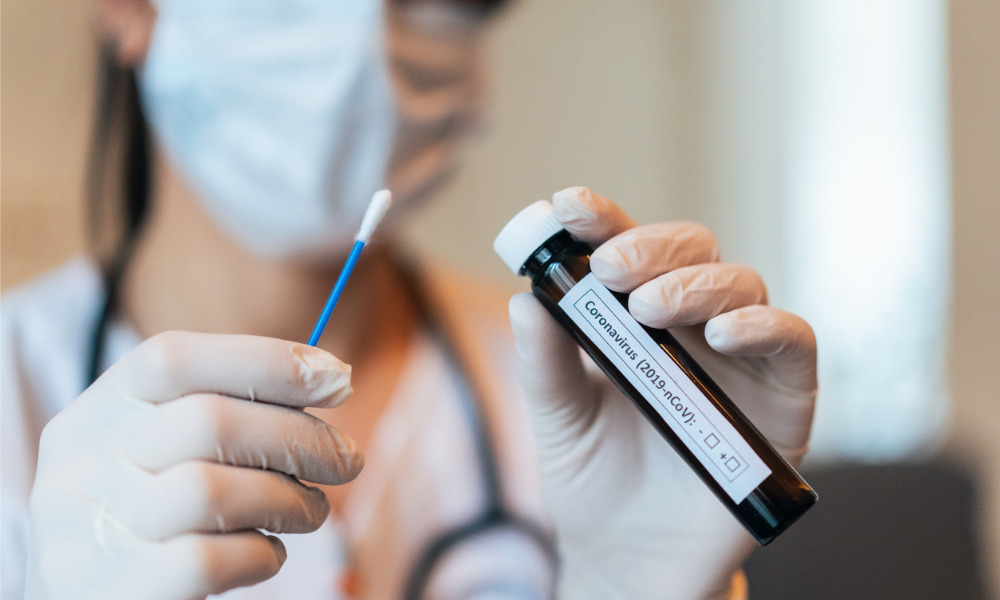‘This new technology can provide test results in hours, even minutes, instead of days’

Ontario will begin using nearly 1.3 million rapid tests to screen staff in long-term care homes and select workplaces to quickly identify and manage outbreaks and stop the spread of COVID-19.
“These new rapid tests are game-changers in the fight against COVID-19. This new technology can provide test results in hours, even minutes, instead of days,” said Premier Doug Ford. “We're deploying them as quickly as possible to protect patients, long-term care residents and the frontline heroes who care for them. These new tools will ensure that Ontario remains the leader in testing in Canada to help stop the spread of this deadly virus.”
In particular, Ontario is looking to use two types of tests. The ID NOW test uses molecular testing with a nasal, nasopharyngeal or throat swab which detects genetic material of COVID-19 to diagnose people with symptoms. Meanwhile, the Panbio test uses antigen testing with a nasopharyngeal swab only. Antigen testing detects specific proteins from the virus to screen and identify people who need further testing.
To date, the province has received approximately 98,000 ID NOW test kits and 1.2 million Panbio rapid antigen test kits. Some of them, however, have already been in use, according to the government.
“Update on personal protective equipment, vaccines, and therapeutics: Since last week, we’ve sent more than 2.9 million pairs of nitrile gloves to the provinces and territories. We’ve also sent out 4.6 million rapid tests over the past few months - and millions more are coming,” Prime Minister Justine Trudeau wrote in a tweet sent out on Wednesday.
ID NOW
ID NOW tests that are initially being used in hospitals and assessment centres in rural and remote communities, as well as to test people as part of early outbreak investigations in hotspot regions where there are high concentrations of COVID-19 cases. Two hospitals are currently using these test kits and 20 additional hospitals preparing to launch rapid testing. Hospitals will be able to test people, such as staff and patients, who are either symptomatic or have been in close contact with someone who has COVID-19.
ID NOW tests continue to be distributed in Simcoe Muskoka, Southwestern Ontario and Eastern Ontario, and the program will be expanded to other areas of the province beginning in December. The test will also be rolled out for Toronto and Peel, and work is underway with Ontario Health and local public health units to support rapid testing deployment across the province, according to the government.
Ontario also said it continues to work closely with Toronto Public Health and Peel Regional Health Unit to bring rapid testing into the regions' outbreak response, using rapid testing to help with early identification and investigation of outbreaks.
“Our government strongly advocated for the approval of these rapid tests to help provide timely access to testing for Ontarians who need it the most,” said Christine Elliott, deputy premier and minister of health. “These tests are helping to improve access to testing in our most underserved communities and allow us to better detect and contain any outbreaks. We are continuously working to expand our testing capacity and evaluate new and emerging technologies to provide safe testing options for a greater number of people.”
Panbio
To date, Panbio tests have been deployed to six long-term care operators for potential deployment in over 30 long-term care homes, 27 retirement homes, eight hospitals. Deployment is also planned for 11 industry partners, such as Ontario Power Generation, Air Canada and Magna, with plans to expand further across the province. Ontario is expecting to receive up to 1.5 million more Panbio tests by the end of December.
Over the next number of weeks, select long-term care homes will use the Abbott Panbio rapid antigen tests to help inform future deployment across the sector, according to the government.
These tests will also be used in a broader eight-week pilot for participating employers in the private, public and non-profit sectors, prioritizing access for health care settings, essential frontline settings, and congregate settings.
“Since day one of COVID-19, our top priority has been to protect the health and well-being of Ontarians, including long-term care residents,” said Dr. Merrilee Fullerton, minister of long-term care. “These rapid tests can help long-term care homes get results immediately allowing them to act faster to prevent COVID-19 from entering the home.”
This pilot program is an important opportunity to learn about the value of antigen screening for asymptomatic workers in a range of workplace settings and will inform future decisions about safely and fully re-opening the economy, according to the government. Participating employers would cover associated costs of delivering antigen rapid tests including human resource expenses and ensure testing follows guidelines as set by the Chief Medical Officer of Health.
In April, Ontario announced temporary measures to provide further flexibility for long-term care homes and allow homes to redirect their staffing and financial resources to essential tasks.
In July, Ontario announced a $1.75 billion funding over five years to add new beds in long-term care homes while also updating design standards for all existing facilities and the ones that will be built in the future to include air conditioning.





